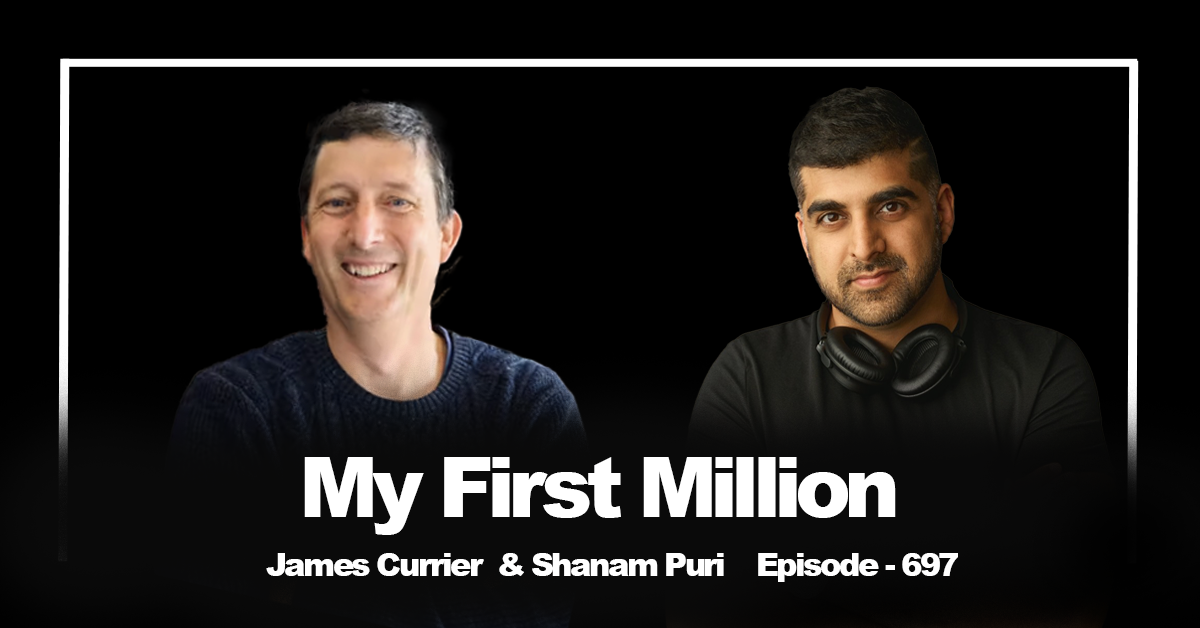Hey everyone,
This week on My First Million, Shaan Puri dives deep with James Currier, a highly successful founder (Tickle, IronPearl, now NFX) and one of the sharpest thinkers on network effects and startup strategy. James brings a unique, often counterintuitive perspective forged from decades of building and investing in Silicon Valley.
Forget the prestigious alumni networks; James shares his “plucked from the mud” origin story, selling worms as a kid and getting into prep school on grit (and a little help from a friend). They unpack the traits of what James calls “savage founders,” the crucial difference between working hard and working fast, why most big ideas fail (and why that’s okay), and how understanding network effects applies to literally everything – even dating and choosing where to live.
Plus, James reveals the real story behind his early company Tickle (hint: personality quizzes were just the start), the billion-dollar mistake he almost made, and why knowing yourself (even the disagreeable parts) is key to entrepreneurial success.
Here are the detailed key insights and takeaways:
1. The “Savage Founder” Mindset
- Speed is Everything: The core trait isn’t just hard work, but speed – the emotional flexibility to abandon what isn’t working and pivot fast towards success, even if it means throwing out previous work. It’s about speed toward the goal, not just speed on the initial idea.
- Aggressive & Competitive: A natural drive to push forward and not stop.
- Disagreeableness (A Superpower): Not needing to please everyone. Savage founders often have “rough edges” and aren’t afraid to say what they think or pursue a contrarian path, even if 99% of people disagree. This allows them to see and act on opportunities others miss.
- Mission Driven (Beyond Trauma): While some founders are driven by past trauma, James emphasizes the “savage” drive is often just an innate desire to go for it every day.
- Type Two Fun: Embracing the struggle. Looking back on extremely difficult periods (like a hackathon with no sleep) and realizing it was fun, wanting to do it again.
2. Network Effects: The Ultimate Defensibility
- Definition: A product or service becomes more valuable as more people use it (e.g., Twitter, Facebook, Microsoft OS, city networks).
- Why They Matter: They create powerful moats and are the core driver behind most of the world’s largest tech companies. Understanding and building them is critical for long-term success. NFX has identified 17 distinct types.
- Life is a Network: Don’t just think about jobs/industries; think about networks. Where you live, who you hire, who your spouse is – these all involve choosing and joining networks with profound impacts on your life.
- Network Bonding Theory: An article James recommends explores how interconnected individuals (nodes) are within a network. Losing one key connection can be manageable, but losing several bonded ones can cause network collapse (relevant to poaching talent or analyzing user churn).
- Building It In: Instead of adding network effects later, design your product/service with them in mind from the start.
3. Language, Naming & Product Strategy
- Language Shapes Reality: James, influenced by linguist George Lakoff, believes language isn’t just descriptive; it creates reality. Picking the right words (like “tax relief” vs. “tax cuts”) can fundamentally shift perception.
- Naming Matters (A Lot): Names dramatically impact user acquisition cost and lifetime value. Go beyond generic keywords. Rules James follows:
- Use Rare Letters: Z, X, Q stand out.
- Fewer Syllables: Two is ideal.
- Good Dog Name Test: Easy to call out.
- Verbable: Can it become a verb?
- Positive Evocation: Should feel good.
- Invented Words: Harder initially, but ultimately ownable (Zillow > Hotels.com).
- Find the Hook: When explaining what you do, provide a “hook” – a specific detail, story, or benefit – that makes it easy for others to ask follow-up questions and engage. Don’t just state your job title.
- Know Your “Why”: Understand the core value proposition for your customer. Tickle’s silly quizzes were just the viral entry point; the underlying goal was deeper self-understanding (though the market wanted fun).
4. Speed, Failure & Emotional Flexibility
- Iterate Rapidly: Most ideas don’t work. The key is volume and the speed to test, abandon, and pivot. James advocates having “83 ideas a week.” (His gaming company tested 27 ideas before finding a hit).
- 28 Times: Snap’s success reportedly came after 27 failed app attempts. Don’t get emotionally attached to the first idea; get attached to the process of finding what works.
- Prepare for Change: You have to be able to throw out code, strategies, and even team members if they aren’t moving fast enough toward the goal. Elon Musk blowing up rockets is an extreme example – failure is part of learning and moving fast.
- Invisible Walls: Often, the biggest speed bumps are self-imposed emotional barriers or adherence to norms (“We can’t meet again same day!”). Challenge these assumptions.
5. The VC Perspective & Founder Dynamics
- What VCs Look For: Speed, savage determination, network effects, large markets (“big ponds”).
- Creator Stubbornness: Founders often have a resistance to pivoting off their initial vision, even when data suggests otherwise. This can be a strength (persistence) or weakness (rigidity).
- Joining vs. Building: James prefers investing in/advising founder-led companies, finding it more fulfilling than being a “professional manager.” He values the direct connection and ability to speak frankly.
Final Thought:
James Currier offers a high-speed, high-intensity look into the often-unspoken realities of building category-defining companies. His emphasis on speed, emotional resilience, network effects, and the “savage” mindset challenges conventional wisdom and provides a powerful framework for anyone trying to build something extraordinary. It’s less about having the perfect initial idea and more about the relentless, fast-paced pursuit of an idea that works.
Find James Currier & NFX: Explore essays on network effects, startup strategy, and more at NFX.com.
Until next time,
The Podcast Notes Team





